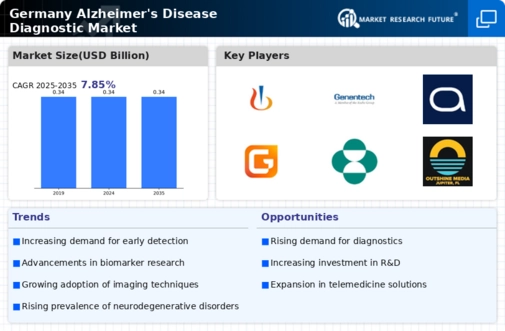The Germany Alzheimer's Disease Diagnostic Market is characterized by a dynamic competitive landscape fueled by advancements in medical technologies and the increasing prevalence of Alzheimer's disease amongst the aging population. Diagnostic methods are being continuously refined to improve early detection and treatment outcomes, which in turn fosters competition among leading firms. Market participants are focusing on innovative solutions, including biomarker identification, imaging technologies, and cognitive testing tools, all aimed at enhancing diagnostic accuracy and efficiency.
The growing emphasis on personalized medicine and patient-centric approaches has also intensified research and development, enabling firms to carve out their niches within this specialized domain.
In the context of the Germany Alzheimer's Disease Diagnostic Market, Novartis stands out due to its extensive research capabilities and innovative product pipeline. The company frequently engages in partnerships and collaborations with academic institutions and healthcare providers to remain at the forefront of Alzheimer's research. Novartis benefits from a strong brand reputation established through years of experience and substantial investments in R&D, enabling it to offer state-of-the-art diagnostic solutions. Furthermore, the company maintains a wide distribution network that not only enhances its market presence but also facilitates better access to its advanced diagnostic tools across Germany.
Genentech also plays a significant role in the Germany Alzheimer's Disease Diagnostic Market through its commitment to developing breakthrough diagnostic solutions that cater to the unique needs of patients and healthcare providers. The company has introduced several key products that focus on early detection and monitoring of Alzheimer's disease, thereby increasing the awareness and understanding of the condition among clinicians and patients alike. Genentech's strengths lie in its robust research foundation, which has led to progressive clinical trials and product innovations tailored to the German market.
Strategic mergers and acquisitions further bolster Genentech’s market presence, allowing it to expand its portfolio and enhance its capabilities in the development and distribution of diagnostic tests specifically for Alzheimer's disease in Germany.

























Leave a Comment